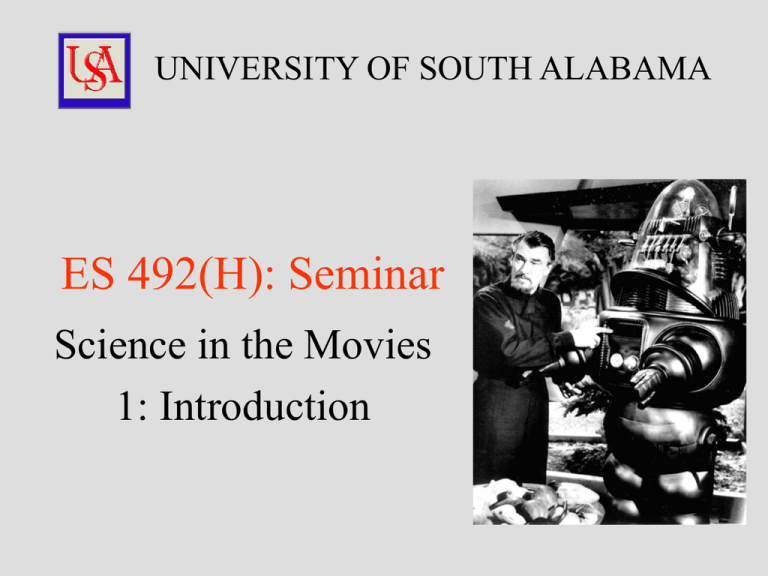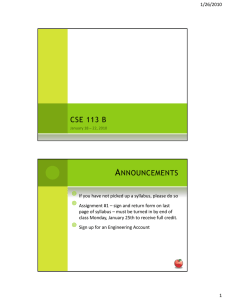ES 492(H): Seminar Science in the Movies 1: Introduction UNIVERSITY OF SOUTH ALABAMA
advertisement

UNIVERSITY OF SOUTH ALABAMA ES 492(H): Seminar Science in the Movies 1: Introduction Introductory Agenda 1. Contact info for D. Haywick 2. ES 492 Course Outline (syllabus) 3. Lecture 1: The Earth’s Interior (Prelude to Journey to the Centre of the Earth) Dr. Doug Haywick Contact Information Office: LSCB 049 Telephone: 460-7569 E-mail: dhaywick@southalabama.edu Office Hours: see syllabus Supporting Materials 1. Syllabi 2. Web site Syllabus (492) Syllabus: Content Syllabus: Content Syllabus: Content Syllabus: Assessment Syllabus: Assessment Syllabus: Other Stuff Supporting Materials 1. Syllabus 2. Web site There is no text book or lab book for ES 492 Lecture support and movie links are available on line: www.southalabama.edu/geology/haywick More rules •The syllabus is a contract, but it’s subject to change. If it is a big change, you will be notified •Turn off your cell phones before you enter the lecture room. They can NOT be left on tables during exams •You can NOT use computers while I am lecturing •If you have a problem, contact me via phone (460-7569) or E-mail (dhaywick@southalabama.edu) Today’s Agenda The Interior of the Earth 1) Geophysical resolution of the interior 2) Volcanoes in general 3) Iceland and hot spots 4) Movie Number 1 http://michaelmay.blogspot.com/2008/11/journey-to-center-of-earth-1959.html The Earth Internal “guts” of the Earth Four Major “Geophysical” Layers Internal “guts” of the Earth Four Major “Geophysical” Layers 1) The Crust (5-35 km thick; rigid rock) Internal “guts” of the Earth Four Major “Geophysical” Layers 1) The Crust 2) The Mantle (2865 km; rigid to ductile rock) Internal “guts” of the Earth Four Major “Geophysical” Layers 1) The Crust 2) The Mantle 3) The Outer Core (2200 km; liquid metal) Internal “guts” of the Earth Four Major “Geophysical” Layers 1) The Crust 2) The Mantle 3) The Outer Core 4) The Inner Core (1270 km; solid metal) The Plate Tectonics Mechanism It is postulated that the convection currents can eventually break up the lithosphere into separate plates Tension Cooler Hotter The Plate Tectonics Mechanism Hence the term “plate tectonics” Asthenosphere Divergent Plate Boundaries Convergent Plate Boundaries San Andreas Fault Transform Fault Plate Boundaries Types of Volcanoes Types of Volcanoes Cinder cone http://www.discoverourearth.org/student/volcanoes/images/shield_volcanoes_big.jpg Shield Volcanoes (Mauna Loa, Mauna Kea, HI) Shield Volcano Lava Fountain Composite Volcanoes in Japan (Mt. Fuji) Phreatic eruption Plinian eruption Air fall deposits (volcanic ash) Iceland Lies along a divergent plate boundary http://www.lonelyplanet.com/maps/europe/iceland/ Iceland But it is also a “hot spot” http://hraun.vedur.is/ja/skyrslur/hotspot/node3.html The Hawaii Hot Spot What’s Actually below a volcano? Next Time Journey to the Center of the Earth (1959) Movie Discussion Think about how the film portrayed science, scientists and volcanoes







